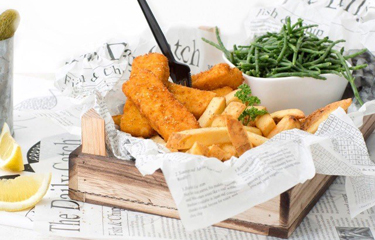Plant-based seafood analog products continue to gain in popularity in Europe. To meet that demand, suppliers have been launching new plant-based products, while companies traditionally aligned with the seafood industry have been investing in plant-based firms.
Agriculture giant Cargill is investing in Bflike, a start-up created by BOX NV. Bflike has patent-pending vegan fat and blood platforms, and it plans to license its proprietary technology and premix ingredient solutions to food manufacturers and retailers so they can commercialize their own meat and fish alternative products.
“This ground-breaking technology results in plant-based meat and fish alternative products that are virtually indistinguishable from their animal-based counterparts, with similar visual appearance (both raw and cooked), texture, mouthfeel, melting behavior, and cooking performance,” Cargill said.
Cargill said its Bflike collaboration will position plant-based food start-ups to scale quickly from pilot to commercialization, using their own production process and machinery, while being supported by Cargill’s supply of ingredients.
The Cargill investment in Bflike came about through a joint venture with Blue Ocean Xlerator NV (BOX), a Dutch private incubator/accelerator focused on sustainable innovations in the food sector. Bflike also benefits from the technical support of TOP BV, a Dutch food technology service provider and a subsidiary company of BOX.
The global plant-based fish market is projected to grow 28 percent annually to reach USD 1.3 billion (EUR 1.1 billion) by 2031, according to market analytics firm Fact.MR. And global volume consumption of protein is expected to nearly double by 2050, according to Belgin Köse, the segment director of enrichment and renewability for Cargill’s starches, sweeteners, and texturizers division in Europe.
“Plant-based protein, as a complement to animal protein, will help fulfill growing consumers’ desire for more options as part of a balanced diet,” Köse said.
Those rosy projections have already generated significant start-up activity.
Giessen, the Netherlands-based Schouten Europe B.V. introduced its second plant-based seafood analog products, Fishless Sticks. Earlier this year, Schouten rolled out a plant-based tuna analog called TuNo.
The Fishless Sticks, for both retail and foodservice customers, are made with rice and wheat.
“Fish sticks are known all over the world and are very popular with children. This way we can teach a new generation which options they have to replace fish in their diet,” Schouten Product Manager Annemiek Vervoort told SeafoodSource.
Vervoot said the Netflix documentary Seaspiracy, which was criticized by the seafood industry for making numerous misleading claims, has helped fuel demand for plant-based seafood analog products.
“We have noticed that…Seaspiracy has made a big impression on people and has contributed to a growing awareness of the importance of plant-based alternatives to fish,” Vervoot said. “This will further increase the demand for fish substitutes.”
By this summer, Schouten plans to launch its Fishless Burger, Fishless Fillet, and Beer Battered Fishless Nuggets.
“These items are also very popular in the fish segment,” Vervoot said.
This spring, Stockholm, Sweden-based Hooked Foods launched Toona, a shredded plant-based tuna product, in restaurants nationwide. The shredded Toona can be used in a wide range of dishes, including sushi, pizza, pasta, and sandwiches, the company said in a press release.
The company is initially launching Toona in restaurants versus retailers because “the chefs in the restaurants are experts on creating delicious dishes and can hence serve our products in a tasty and attractive way to the consumers,” Hooked Co-founder Emil Wasteson told SeafoodSource in December. “If we sold it directly to consumers, they might not know how to use it in the best way.”
Hooked Foods’ goal is to get as many people as possible to switch to plant-based alternatives to fish, "without compromising on taste, quality, and nutrition,” the company said.
Photo courtesy of Schouten







